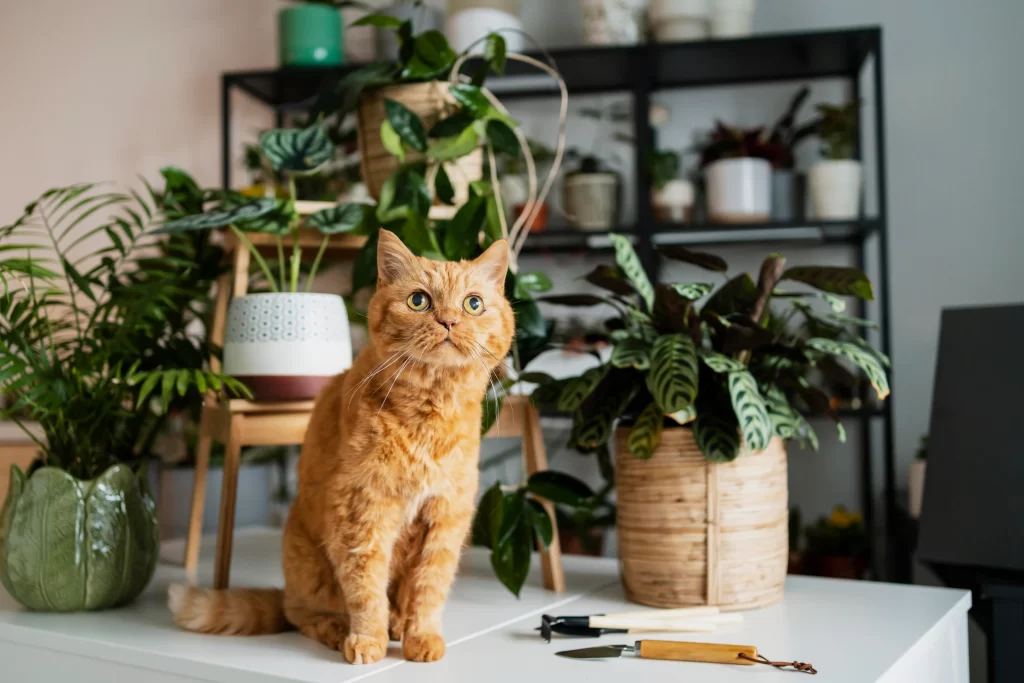Does your family have a cat? In that case, you will soon discover that the ZZ plant contains toxins that are toxic to cats. However, some plants have toxic properties and can be dangerous if your cat consumes the leaves. The ZZ plant (Zamioculcas zamiifolia) is a small tropical indoor house plant grown for its attractive flowers and to add value to the interior. Additionally, the sweet nature of this plant often attracts cats through its odor, but they might also ingest it accidentally. However, some individuals are curious about the toxic properties of ZZ plants, especially cats. This blog will detail the properties of ZZ plant toxicity and discuss important considerations for keeping our cats safe.
This page covers the following points:
- Zamioculcas Zamiifolia: The Houseplant Green Companion
- Geographical origin
- Light
- Water
- Temperature
- Green Alliance for Clean Air
- Pet friendly?
- The Dark Side of ZZ Plants
- Exploring the Cause Behind ZZ Plants‘ Toxicity to Cats
- Statistical study
- Toxic Houseplants: Consider Your Cat’s Well-being
- The Warning Signs: Common Symptoms of ZZ Plant Toxicity
- Ingesting ZZ plants: Prevalent Preventive Steps to Take
- Take help from a specialist/veterinarian
- Rinse the mouth
- Home remedies for cats that got infected by the ZZ Plants
- Consider Safety Measures to Take
- Remove toxic plants
- Educate yourself
- Provide alternatives
- Toxic plants for cats: ZZ plants are poisonous to ingest
ZZ plants, also known as Zamioculcas Zamiifolia, can be toxic if ingested by cats. However, the toxicity of Zamioculcas zamiifolia plants to cats is due to certain toxic compounds present in the plant. Moreover, keeping ZZ plants out of reach and considering pet-safe alternatives is essential to ensure your cat’s well-being. Let’s get on board to explore how you can do this measuring check!
Zamioculcas Zamiifolia: The Houseplant Green Companion
ZZ plants, scientifically named Zamioculcas zamiifolia and common name aroid palm or ZZ plants in the Araceae family, are popular low-maintenance houseplants that have gained market value for their appearance, manageable size and are easy to propagate, making them an excellent choice for beginner gardeners to add beauty to the indoor interior. Initially, the new growth is bright green, but it becomes deeper green as it matures.
Zamioculcas zamiifolia plants houseplants are popular in the marketplace because of their adaptability to low maintenance, slow growth rate, moderate light, and less monitoring conditions, making them an excellent choice for offices or rooms with medium natural light.
Geographical origin
Originating from Eastern Africa, these plants have gained immense popularity due to their ability to survive in various indoor environments.
However, with waxy foliage, the dark green leaves of Zamioculcas zamiifolia plants beautify any space. Their unique leaflets grow to form upright, arching stems. This growth pattern gives them a distinctive tropical look.
Light
The light should be bright and indirect, but it can also tolerate limited light (as in an office or home space). Compared to direct sunlight, it is not recommended.
Water
Water is the most crucial factor in ZZ plants’ care. If you want ZZ plants to develop well, water them at least once every couple of weeks (10-14 days). However, you should check the soil’s condition before pouring water; it should be dry, as ignoring this factor may lead to underwater or overwater conditions.
Temperature
Plants from the tropical region develop well in warm climates between 65 and 80 degrees Fahrenheit (18 °C- 26 °C). Therefore, Zamioculcas zamiifolia (ZZ) plants should not be kept below 55°F (12 °C); if you can, keep it at 60°F (~16 °C) in winter. However, in a warm environment, the leaves survive and develop well.
Green Alliance for Clean Air
Compared with other plants, ZZ plants are famous for their air-purifying properties, which reduce ozone concentrations most effectively and help lower the ozone footprints ejected daily from our household equipment, like refrigerators, microwave ovens, etc. However, meanwhile, you contribute to reducing ozone footprints and helping Earth’s nature and a healthier indoor atmosphere for you.
Overall, ZZ plants are an excellent choice for indoor and outdoor gardeners, offering beauty, long-lastingness, and low monitoring.
Pet-Friendly?
Not really! Mostly all of the ZZ plants have toxin properties if ingested by household animal companions, especially when it comes to cats and dogs. However, this page covers all aspects and silent features of Zamioculcas zamiifolia plants and their toxic nature to cats.

The Dark Side of ZZ Plants
The ZZ plant (Zamioculcas zamiifolia), famous for its low-maintenance nature and striking foliage, can be toxic to animals, especially dogs and cats. However, the Zamioculcas zamiifolia plant contains calcium oxalate crystals responsible for its toxicity. Therefore, when a cat chews or ingests any part of the plant, these crystals can cause irritation and inflammation in the cat’s mouth, tongue, and throat if ingested.
Exploring the Cause Behind ZZ Plants’ Toxicity to Cats
ZZ plants are considered toxic to cats due to the Calcium Oxalate crystals in their leaves. If cats eat ZZ plant leaves, these crystals have gas-toxin properties that can cause irritation and swelling, leading to symptoms such as drooling, difficulty swallowing, and vomiting. It is essential to keep Zamioculcas zamiifolia plants out of the reach of cats and seek expert advice and a proper check-up if ingestion is the case.

Statistical Study
Here is a statistical analysis of indoor plants’ poisoning of companion animals, a severe problem. However, toxic house plants containing Calcium Oxalate crystals cause this problem for animals.

The statistics show that the Oxalate Crystal toxins in house plants share the dominating percentage (40.0%) that threaten the cat’s or other companion animals’ health[1]Indoor Companion Animal Poisoning by Plants in Europe Read.
Toxic Houseplants: Consider Your Cat’s Well-being
The ZZ plant (Zamioculcas zamiifolia) is considered toxic to cats. However, if a cat eats the ZZ plant or comes into contact with its sap, it can exhibit various signs of toxicity.
The Warning Signs: Common Symptoms of ZZ Plant Toxicity
Symptoms of Zamioculcas zamiifolia plant toxicity in cats may include:
- Choking
- Swallowing difficulty
- Oral irritation
- Drooling
- Imbalanced appetite
- Vomiting
If you notice your cat has ingested the ZZ plant or is showing signs of plant toxicity, it is crucial to immediately get veterinary or specialist help. Only an expert can provide proper aid to your cat’s condition.

Ingesting ZZ plants: Prevalent Preventive Steps to Take:
If you suspect your cat has eaten or chewed on a Zamioculcas zamiifolia plant, the fastest action is to call your veterinarian immediately. As a result, you should:
Home remedies for cats that got infected by the ZZ Plants
Using home remedies to treat cats infected with ZZ plant poison is not recommended. Seek immediate veterinary care if you experience any of these symptoms. Meanwhile, please take advice from your veterinarian and follow their instructions to ensure your cat’s well-being.
Take help from a specialist/veterinarian
Inform the vet about the situation and follow their guidance. However, they may instruct you to observe your cat closely for any adverse reactions or recommend immediate medical attention. Therefore, notice the symptoms and any relevant information because it will help the veterinarian provide the best care for your cat or other companion animals.
Rinse the mouth
If there are signs of plant residue in your cat’s mouth, carefully rinse it with water. Be cautious not to force water into your cat’s throat, as it may cause choking.
Consider Safety Measures to Take
Prevention is critical to keeping our home companions safe from toxic plants. Consider the following measures:
Remove toxic plants
If you have a ZZ plant or any other known toxic plants that contain Oxalate Crystal toxins or Calcium-Oxalate Crystal toxins in your home, consider relocating them to areas inaccessible to your cat.
Educate yourself
Please familiarize yourself with the plants in your home and their potential toxicity to cats. Meanwhile, for Plants that are toxic to animals and those that are not, their data can be retrieved from reliable sources such as the American Society for the Prevention of Cruelty to Animals (ASPCA).
Provide alternatives
Use cat-friendly and non-toxic grasses and plants to offer your cat safe and attractive alternatives. However, the chewing behavior can be redirected to a harmless option by doing so.

Toxic plants for cats: ZZ plants are poisonous to ingest
Statistical analysis shows how much more indoor Zamioculcas zamiifolia plants can affect cats than other indoor companion animals. However, the following statistical analysis summarizes the plants that affect companion animals in Europe and their poisoning risk[2]Indoor Companion Animal Poisoning by Plants in Europe Read.

Percentage share of dogs and cats in animals
The share of Dogs and cats in animals is 20%, which depicts that in the list of companions, animals, cats, and dogs are highly affected by ZZ plants containing Oxalate Crystal toxins.
Cats and ZZ Plants: A Conclusive Note
As responsible pet owners, prioritizing our cats’ safety and well-being is essential. The Zamioculcas zamiifolia plant, with its toxic properties, can pose a risk if ingested by indoor companion animals. Therefore, It is possible to ensure a safe environment for cats by understanding the potential dangers, recognizing the symptoms of toxicity, and taking preventative measures. However, consulting a veterinarian is always best if you notice ZZ plant toxicity or other plant-related health concerns.



